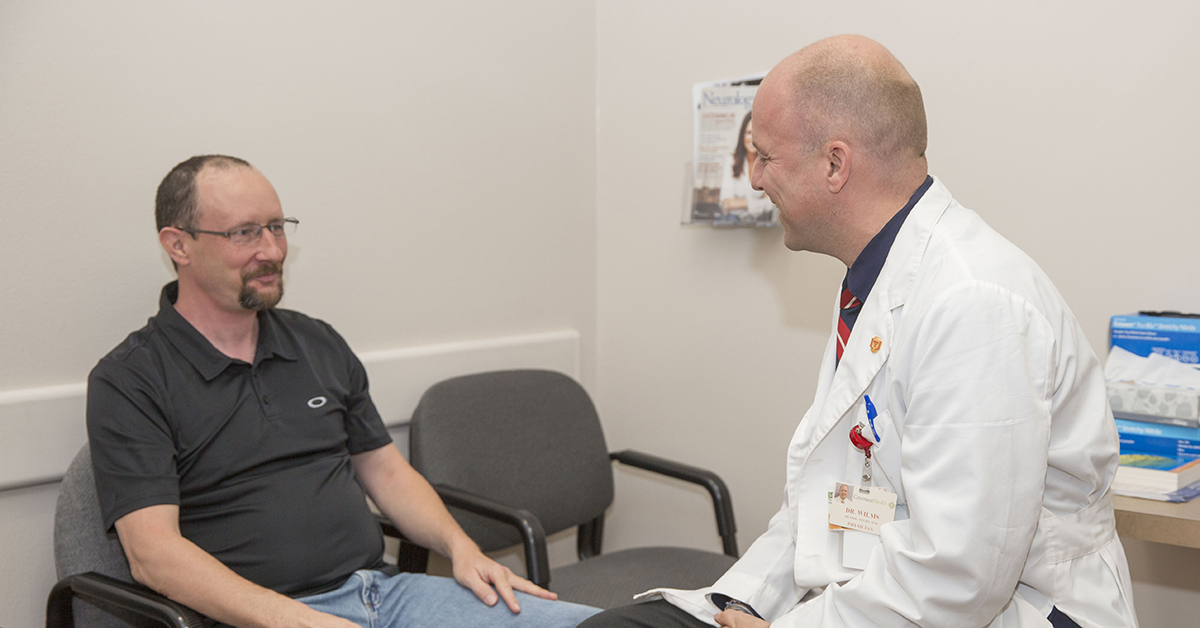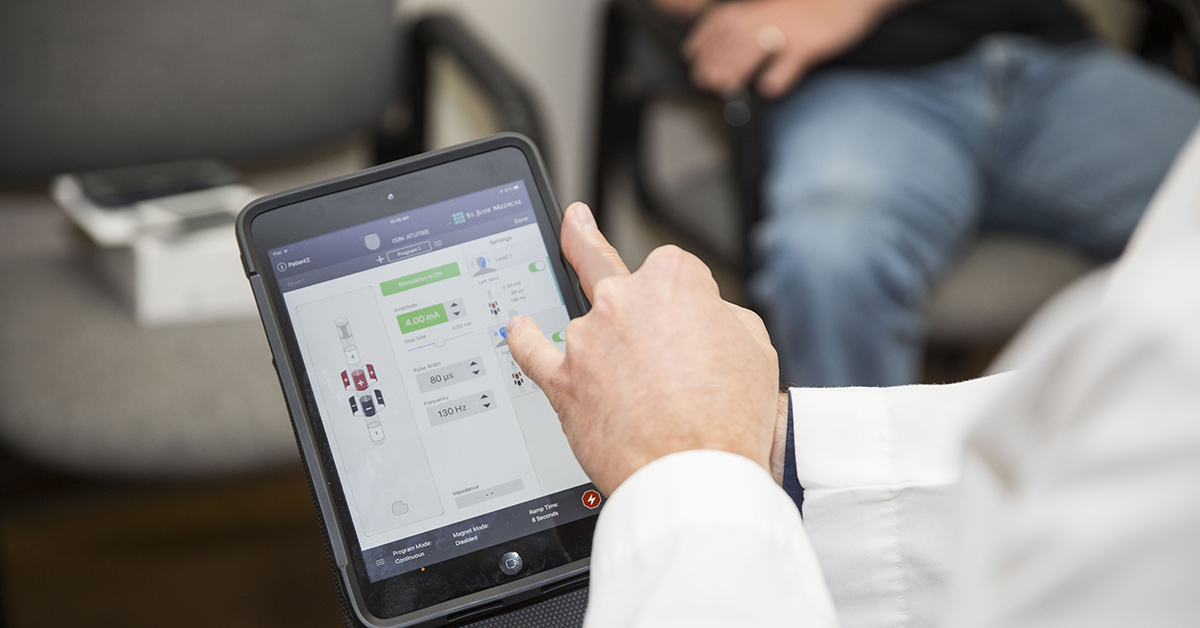Technology Helps Parkinson's Disease Patient Regain Independence
Deep Brain Stimulation Stops Disease Tremors

Luton at a checkup with Dr. Wilms to adjust his deep brain stimulation device.
Errin Luton was 30 years old when he began to notice stiffness in his hands and a
small twitch in his fingers. A police officer in Dallas at the time, he later noticed
the twitching began to progress from his right hand to the rest of his body. In 2007,
Luton was diagnosed with early onset Parkinson’s disease. Ten years into his disease,
he could not have imagined that the flip of a switch would help control his tremors
“I was devastated when I was diagnosed,” Luton said. “I had no clue what Parkinson’s
disease was.”
The National Institute of Neurological Disorders and Stroke states Parkinson's disease
belongs to a group of conditions called motor system disorders. The four primary symptoms
are tremors or trembling in hands, arms and legs; stiffness of the limbs and trunk;
slowness of movement and impaired balance and coordination.
Henrik Wilms, M.D., a neurologist at Texas Tech Physicians, said the mean age of onset
in Parkinson’s disease is 70.
“When someone is younger than 40 years of age like Errin, it is referred to as young
onset Parkinson’s disease,” Wilms said. “Normally, a patient who is 40 also may have
a different lifestyle or activity level like keeping up with younger children and
employment.”
Wilms said the traditional drug therapies used for Parkinson’s disease patients have
side effects that will not allow patients to conduct their normal activities.
“When you have Parkinson’s disease, the patient’s brain stops producing enough dopamine,”
Wilms said. “Dopamine is the chemical that communicates with your nerves to coordinate
movement and balance. Yet, as patients’ symptoms progress, more medication is needed
causing sleepiness and dyskinesia (the jerking involuntary movements.)”
As Luton has dealt with the disease through the years, his life changed drastically.
He quit his job, was unable to drive and symptoms continued to worsen.
“My life depended on medications,” Luton said. “I couldn’t balance. I had uncontrollable
tremors, and I couldn’t do anything without assistance. My medications also started
to cause dyskinesia. I was taking up to 16 pills a day.”
Wilms said Parkinson’s disease is a chronic and progressive disease with no cure.
“It’s about chasing the symptoms and trying to help each patient,” Wilms said. “In
Errin’s case, he had been on drug treatments for about 6 or 7 years. I knew he might
be a good candidate for deep brain stimulation. As a young resident my colleague told
me about this procedure years ago. It is not new but has advanced throughout the years.”
Deep brain stimulation was introduced in 1990 and works by sending targeted stimulation
signals to areas of the brain that cause the involuntary movements, using a pacemaker-like
device. The electrodes produce electrical impulses to regulate a cluster of nerves
that cause the tremors. The U.S. Food and Drug Administration approved deep brain
stimulation for patients with Parkinson’s disease. Luton was a good candidate and
in October 2017, underwent the procedure in San Angelo with neurosurgeon Luis Duarte,
M.D.
“I am not going to lie,” Luton said. “The first two months after the surgery were
hard. It is brain surgery and pain comes with that. Talking to Dr. Wilms about my
symptoms at the time made this procedure the best option to go. It took about 6 weeks
after I had the implant that my tremors stopped. After about a couple of weeks they
returned but not as strong.”

A deep brain stimulation system controls Luton's tremors through an iPad.
Gradually with each visit, Luton’s symptoms have diminished. Wilms adjusts the Abbott
Infinity™ Deep Brain Stimulation System devise at each appointment. The deep brain
stimulation device streamlines the therapy with a wireless IOS software platform using
an Apple iPad for programming. The physician is the only person who can adjust the
device. As Wilms turns off the deep brain stimulator to adjust it, within seconds
Luton’s tremors reappear.
“It is actually kind of crazy, but my brain is connected to an iPad,” Luton said.
“Every time I have gone back to Dr. Wilms to adjust it, my tremors have lessened.
I am at the point that I have no tremors on my right side. This visit was for him
to make adjustments to help with tremors on my left arm.”
Wilms stresses this device is not for everyone. An ideal candidate must have good
responses to the drug therapies for deep brain stimulation to work. Unfortunately,
20 years into the disease most patients also experience symptoms of impaired memory
and concentration. If this has progressed into full-blown dementia, then the patient
is not a good candidate. Some patients also suffer from depression and if it were
an uncontrolled depression, the patient would not be a candidate for deep brain stimulation.
As Wilms turns back on the deep brain stimulation device from his iPad, Luton’s tremors
slowly begin to stop again.
“We are watching miracles,” Wilms said.
Luton, who now lives in Borger, has now reduced his medications by 40 percent and
is driving and getting back to activities Parkinson’s disease was keeping him from.
He hopes to return to college and even plans on training to run a marathon.
“I feel a hundred percent better and even sleep most of the night,” Luton said. “My
kids love it. They think it is great that I am a lot more active and got my movement
that I had lost throughout the years. They joke that it is cool to have a bionic dad.”
Related Stories
Celebrating Veterans: TTUHSC’s General Martin Clay’s Legacy of Service and Leadership
From his initial enlistment in the Army National Guard 36 years ago to his leadership in military and civilian health care management roles, Major General Martin Clay’s career has been shaped by adaptability, mission focus and service to others.
Texas Tech University Health Sciences Center School of Nursing Named Best Accelerated Bachelor of Science in Nursing Program in Texas
The TTUHSC School of Nursing Accelerated Bachelor of Science in Nursing (BSN) program has been ranked the No. 1 accelerated nursing program in Texas by RegisteredNursing.org.
TTUHSC Names New Regional Dean for the School of Nursing
Louise Rice, DNP, RN, has been named regional dean of the TTUHSC School of Nursing on the Amarillo campus.
Recent Stories
The John Wayne Cancer Foundation Surgical Oncology Fellowship Program at Texas Tech University Health Sciences Center Announced
TTUHSC is collaborating with the John Wayne Cancer Foundation and has established the Big Cure Endowment, which supports the university’s efforts to reduce cancer incidence and increase survivability of people in rural and underserved areas.
TTUHSC Receives $1 Million Gift from Amarillo National Bank to Expand and Enhance Pediatric Care in the Panhandle
TTUHSC School of Medicine leaders accepted a $1 million philanthropic gift from Amarillo National Bank on Tuesday (Feb. 10), marking a transformational investment in pediatric care for the Texas Panhandle.
Texas Tech University Health Sciences Center Permian Basin Announces Pediatric Residency Program Gift
TTUHSC Permian Basin, along with the Permian Strategic Partnership and the Scharbauer Foundation, Feb. 5 announced a gift that will fund a new pediatric residency.
